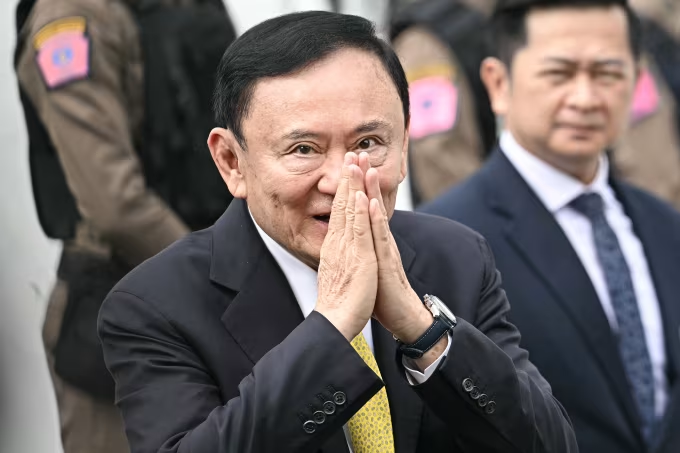Thailand’s Supreme Court has ordered former prime minister Thaksin Shinawatra back to prison for one year, marking a dramatic twist in the long-running saga of the billionaire political heavyweight.
Shinawatra, 76, who led the country from 2001 until his ouster in a 2006 military coup, made a high-profile return to Thailand in 2023 after 15 years in self-imposed exile.
Shortly after his comeback, he was handed an eight-year sentence for corruption, abuse of power, and conflict of interest.
Despite the verdict, the former Manchester City owner never spent a night in a prison cell.
Instead, he stayed in a private suite at Bangkok’s Police General Hospital, citing chest pain, high blood pressure, and low oxygen levels.
Within months, King Maha Vajiralongkorn commuted his jail term to a single year, and Shinawatra was granted parole in February 2024.
But on Tuesday, the Supreme Court ruled that his extended hospital stay was unlawful and did not count as time served. Video obtained by Reuters showed a convoy of cars said to be transporting him to Bangkok Remand Prison.
The court found that Shinawatra’s ailments could have been treated without hospitalization, stating, “The defendant benefited from remaining in the hospital without having to return to custody at Bangkok Remand Prison until his eventual release.”
The leniency he enjoyed has long fueled suspicions that Thaksin struck a behind-the-scenes deal with Shinawatra’s royalist and conservative elites to smooth his return.
The fact that his family’s Pheu Thai Party re-entered government the same day he landed back in Bangkok only heightened speculation. Thaksin has consistently denied making such an arrangement.
In June, the Medical Council suspended two doctors accused of issuing falsified records to justify his hospital stay, while a prison doctor was reprimanded for failing to meet professional standards.
Reacting to Tuesday’s verdict, Shinawatra struck a conciliatory tone in a social media post, “Today I choose to look forward, letting all past matters come to a resolution. Though I may lack physical freedom, I still have the freedom of thought for the benefit of the nation and people.”
His daughter, Paetongtarn Shinawatra — who briefly served as prime minister herself, told reporters outside court that her father remained in “high spirits,” adding that their Pheu Thai Party “will carry on doing (our) political duty as the opposition party.”
Supporters gathered outside the courthouse, some in tears. “I am so sad today,” said 64-year-old Oy, who credited Shinawatra’s universal healthcare policy for saving her husband’s life. “Without it, he wouldn’t have had heart surgery.”
The ruling marks another blow to the Shinawatra dynasty. Shinawatra was present in court for the judgment, but on Thursday flew to Dubai, officially for a health check, sparking rumors that he had once again left Thailand.
The decision was the last of three major court cases against the Shinawatra clan.
Shinawatra recently escaped a lese majeste charge that could have carried a 15-year sentence, but his daughter was not as fortunate.
Less than two weeks ago, the Constitutional Court ousted her from office over a leaked call with Cambodia’s former leader.
For more than two decades, the Shinawatras and their allies have dominated Thai politics, winning nearly every election since 2001. But the establishment, often with the military and judiciary on its side, has repeatedly moved to weaken their grip.
While in exile, Shinawatra still influenced politics from afar, with his sister Yingluck serving as prime minister until she was ousted in 2014, and his brother-in-law briefly holding the top job as well.
Now, with their party ousted from power last week and Anutin Charnvirakul sworn in as Thailand’s new prime minister on Sunday, analysts say the family’s once-powerful political machine may finally be running out of steam.
